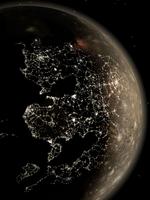| Monday, April 26, 2004 |
| Beyond Civilization |
 This is from a synopsis of "Beyond Civilization" by Daniel Quinn: This is from a synopsis of "Beyond Civilization" by Daniel Quinn:One of our most fundamental cultural beliefs is this, that Civilization must continue at any cost and not be abandoned under any circumstance. This notion seems intrinsic to the human mind --self-evident, like The shortest distance between two points is a straight line. Implicit in this belief about civilization is another: Civilization is humanity's ULTIMATE invention and can never be surpassed. Both these beliefs exemplify the cultural fallacy, which is the notion that one's beliefs are not merely expressions of one's culture but are intrinsic to the human mind itself. The effect of this fallacy is that it's almost impossible for the people of our culture to entertain the idea that there could be any invention beyond civilization. Civilization is the end, the very last and unsurpassable human social development.I haven't read the book. I've read Ishmael, though. And I probably agree with him. We've got to get over that big monolithic hierarchical civilization thing. I'm not sure I would call that "beyond civilization". I've called it a "new civilization", which would a more bottom-up, distributed, self-organizing, free, collective intelligence way of organizing. Which is contrasted to the "old civilization" which is hierarchical and centralized. Somebody is in charge, somebody owns and controls most elements you need to live your life, and collective stupidity is the norm. I agree as well that a new kind of tribes might be a key. Get together with the people you're in sync with, and work together. There's no need to try to impose your view on everybody else in the world. But there are problems to solve as to how it would work. I don't know if Quinn gives the answers to that. I'm not sure if it will do it just to work for more simplicity in general. The problem might well be too much simplicity in the old civilization, too much simple-minded centralized decision making, and what is needed is more complexity. Complexity in the good sense - a more intelligent and flexible system, distributed but inter-connected in a synergetic and self-adjusting manner. Here's more, from a review at Amazon: Futurist Daniel Quinn (Ishmael) dares to imagine a new approach to saving the world that involves deconstructing civilization. Quinn asks the radical yet fundamental questions about humanity such as, Why does civilization grow food, lock it up, and then make people earn money to buy it back? Why not progress "beyond civilization" and abandon the hierarchical lifestyles that cause many of our social problems? He challenges the "old mind" thinking that believes problems should be fixed with social programs. "Old minds think: How do we stop these bad things from happening?" Quinn writes. "New minds think: How do we make things the way we want them to be?"Indeed, I'm all for that. The old civilization is woven of a material that doesn't really serve most of us. A lot of the structures were created with an eye towards how to control large populations, and milk them for their productive output. Our economic system is a pyramid scheme, and there's not much democracy anywhere - despite what it is made to appear like. It is sometimes possible to very locally create good conditions of democracy, freedom, and healthy economy. Which makes most people think that the system is inherently alright, and stand up to defend it. But there's a hole in the bottom of the barrel. The system is slanted so it is always an unhill battle and synergy is hard to attain. There will be somebody standing on top of the hill to tell you that the weather is nice and everything is fine, and you just need to work harder. But most people are stuck trying to get up the hill, while powering somebody else's water wheel. And it doesn't have to be that way. This planet can quite well support that we all live comfortably, even abundantly, and without destroying it in the process. But, yes, we need to get beyond our old kind of civilization, which isn't really ours anyways, but that of our kings and emperors and bankers who managed to harness our collective irresponsibility to their advantage. [ Culture | 2004-04-26 10:03 | 1 comment | PermaLink ] More > |